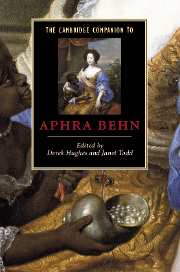Book contents
- Frontmatter
- 1 Aphra Behn: The Documentary Record
- 2 Behn, women, and society
- 3 Aphra Behn and the Restoration theatre
- 4 The political poetry of Aphra Behn
- 5 Behn’s dramatic response to Restoration politics
- 6 Tragedy and tragicomedy
- 7 Behn and the unstable traditions of social comedy
- 8 The Cavalier myth in The Rover
- 9 ‘The story of the heart’: Love-letters between a Noble-Man and his Sister
- 10 Oroonoko: reception, ideology, and narrative strategy
- 11 ‘Others’, slaves, and colonists in Oroonoko
- 12 The short fiction (excluding Oroonoko)
- 13 Pastoral and lyric: Astrea in Arcadia
- 14 Aphra Behn’s French translations
- Further reading
- Index
- Series list
3 - Aphra Behn and the Restoration theatre
Published online by Cambridge University Press: 28 May 2006
- Frontmatter
- 1 Aphra Behn: The Documentary Record
- 2 Behn, women, and society
- 3 Aphra Behn and the Restoration theatre
- 4 The political poetry of Aphra Behn
- 5 Behn’s dramatic response to Restoration politics
- 6 Tragedy and tragicomedy
- 7 Behn and the unstable traditions of social comedy
- 8 The Cavalier myth in The Rover
- 9 ‘The story of the heart’: Love-letters between a Noble-Man and his Sister
- 10 Oroonoko: reception, ideology, and narrative strategy
- 11 ‘Others’, slaves, and colonists in Oroonoko
- 12 The short fiction (excluding Oroonoko)
- 13 Pastoral and lyric: Astrea in Arcadia
- 14 Aphra Behn’s French translations
- Further reading
- Index
- Series list
Summary
The Restoration theatre gave women an unprecedented public presence and identity. Actresses for the first time appeared on the public stage. Although they were the objects of lust, gossip, seduction, and (occasionally) assault, they also excited admiration through their talent, and some - such as Mary Betterton - enjoyed long and distinguished careers without any hint of scandal. The theatre also gave women other forms of prominence. In February 1663, Katherine Philips' translation of Corneille's La Mort de Pompée was performed in Dublin; her translation of Corneille's Horace, completed after her death by Sir John Denham, was performed at court in 1668 and at the King's Company's Bridges Street theatre in 1669. In 1668 Sir William Davenant's widow Mary assumed temporary managership of the Duke's Company, during the minority of her sons. In 1669 the King's Company staged Frances Boothby's Marcelia: the first original play by a woman to reach the public stage. And, in 1670, Aphra Behn emerged as the first British woman to make a living as a creative writer, with her tragicomedy The Forc'd Marriage, performed in September 1670 by the Duke's Company, the more successful and adventurous of the two companies. Two plays by Elizabeth Polwhele, The Faithful Virgins and The Frolicks, may also have been performed in 1670–1. Behn thus made her d´ebut at a time when the stage was evidently quite open to women writers; yet only she went on to make a career as a dramatist.
- Type
- Chapter
- Information
- The Cambridge Companion to Aphra Behn , pp. 29 - 45Publisher: Cambridge University PressPrint publication year: 2004
- 2
- Cited by



